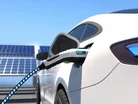Oregon plans to temporarily suspend EV rebate programme

The state of Oregon plans to temporarily suspend its Clean Vehicle Rebate Programme, which has dispersed over $71 million to drivers buying or leasing new electric vehicles (EVs) since its start five years ago.
The decision comes over concerns that the scheme will run out of money due to incredibly high demand. This is great news for the EV market, which is booming in the state of Oregon, with a staggering 60,600 electric vehicles having been registered in the state to date.
While it is an unfortunate blow for any Oregonians who had intended to use the scheme in order to buy or lease a new EV, it shows great progress for the state meeting its electrification goals. Oregon plans to ban the sale of new vehicles powered by internal combustion engines (ICEs) by 2035, so it is heartening to see the citizens taking the upcoming ban seriously.
Though temporarily suspending the programme does represent a great step forward in the global adoption of EVs, it could also be seen as a friction point for continued success in the market.
Why does the EV market need rebate programmes?
EVs in most cases are significantly more expensive than ICEs, rebate programmes help give low and middle-income households a fair chance to make the switch. While the rebate policy was always designed as a stop-gap measure to encourage EV adoption, rather than a permanent scheme, there is merit to it remaining in place for the foreseeable future.
Widespread EV adoption is important for reaching net zero goals meaning any incentives to buy or lease an EV are positive. At the end of the day, money is the main driving factor for many households, so encouragement to switch to the EV market instead of buying a much cheaper second-hand ICE is the end goal.
According to Jeff Allen, Executive Director of Oregon-based EV non-profit Fourth, “Forty percent of our climate pollution comes from transportation, so we absolutely have to electrify every vehicle on the road to meet our climate goals”. Buying a second-hand ICE means that car could be on the road for another 20 years, which slows progress to meeting net zero goals.
While it’s true that these policies will need to end once EV ownership becomes the norm, there is still work to do in getting new consumers to embrace the electric market.
Rebates should return by 2024
All is not lost for EV enthusiasts who had been counting on these rebates to help them make the switch. Oregonians who buy or lease a new EV by 30 April 2023 will still have 6 months after the deadline to claim their rebates before the scheme is suspended. After which, consumers may have to wait until March 2024 to enjoy the benefits of this generous policy again.
While unexpectedly high demand for these rebates is no doubt a positive sign that things are moving in the right direction, it proves that government schemes encouraging the switch to EVs must continue. Rebates may be the only way some lower-income drivers will be able to afford electric vehicles. The last thing we want is to come this far and lose momentum due to poor fiscal planning.
- Voltpost Secures Grants for Nationwide Lamppost EV ChargersCharging & Infrastructure
- San Francisco Expands Curbside EV Charging ProgrammeCharging & Infrastructure
- How Amazon hit one Billion Electric Deliveries in the USFleet & Commercial
- Antimony Crisis: Challenges & Opportunities for EVsTechnology

